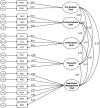Factor structure of the Chinese version of Emotion Regulation Goals Scale
- PMID: 39091708
- PMCID: PMC11292033
- DOI: 10.3389/fpsyg.2024.1392879
Factor structure of the Chinese version of Emotion Regulation Goals Scale
Abstract
Recent studies in Western cultures suggested emotion regulation goals have important implications for mental health. This study aimed to test the factor structure of Emotion Regulation Goals Scale (ERGS) in a Chinese cultural context. Exploratory factor analysis (EFA) and confirmatory factor analysis (CFA) were first used to examine the factor structure of the ERGS, and then reliability and validity tests were conducted to examine the psychometric properties of the ERGS. Results showed that the original five-factor model demonstrated fit during both EFA and CFA, and was thus adopted for further psychometric analyses. Most of the five factors were significantly associated with emotion regulation tendencies and negative emotional outcomes (e.g., depression), except for the non-significant associations between pro-hedonic goals and expressive suppression, and pro-social and impression management goals with depression. The ERGS also showed good internal consistency and split-half reliability. However, the test-retest reliabilities varied substantially across the five factors. The pro-hedonic goal had a higher test-retest reliability, whereas the contra-hedonic, performance, pro-social, and impression management goals showed lower values, especially the latter two. In brief, the ERGS showed a promising five-factor structure in assessing emotion regulation goals in Chinese cultural context.
Keywords: confirmatory factor analysis; emotion regulation goals; exploratory factor analysis; reliability; validity.
Copyright © 2024 Chen, Chi, Luo, Zhu, Chen, Wang and Yuan.
Conflict of interest statement
The authors declare that the research was conducted in the absence of any commercial or financial relationships that could be construed as a potential conflict of interest.
Figures
Similar articles
-
The Emotion Regulation Goals Scale: Advancing its psychometric properties using item response theory analysis.J Clin Psychol. 2022 Sep;78(9):1940-1957. doi: 10.1002/jclp.23343. Epub 2022 Mar 16. J Clin Psychol. 2022. PMID: 35294783
-
Reliability and validity of the Chinese version of the Brief Emotion and Regulation Beliefs Scale in Chinese nursing students.BMC Nurs. 2022 Aug 9;21(1):221. doi: 10.1186/s12912-022-00992-1. BMC Nurs. 2022. PMID: 35945531 Free PMC article.
-
Assessing Emotion Regulation Difficulties Across Negative and Positive Emotions: Psychometric Properties and Clinical Applications of the Perth Emotion Regulation Competency Inventory in the Chinese Context.Psychol Res Behav Manag. 2024 Sep 24;17:3299-3311. doi: 10.2147/PRBM.S478246. eCollection 2024. Psychol Res Behav Manag. 2024. PMID: 39346088 Free PMC article.
-
Psychometric properties and gender invariance of the 8-item emotion regulation questionnaire (ERQ-8) among Chinese university students.PLoS One. 2024 Jan 2;19(1):e0296035. doi: 10.1371/journal.pone.0296035. eCollection 2024. PLoS One. 2024. PMID: 38166088 Free PMC article.
-
Reliability and validity estimation of Urdu version of Children Emotion Management Scales (CEMS) in Pakistan.Front Psychiatry. 2024 Mar 28;14:1214708. doi: 10.3389/fpsyt.2023.1214708. eCollection 2023. Front Psychiatry. 2024. PMID: 38605884 Free PMC article.
Cited by
-
[Investigation of the Reliability and Validity of the Chinese Version of the Beck Depression Inventory-Ⅱ in Middle School Students of Yi Ethnicity in Liangshan Prefecture, China].Sichuan Da Xue Xue Bao Yi Xue Ban. 2024 Nov 20;55(6):1567-1572. doi: 10.12182/20241160607. Sichuan Da Xue Xue Bao Yi Xue Ban. 2024. PMID: 39990828 Free PMC article. Chinese.
References
-
- Aldridge V. K., Dovey T. M., Wade A. (2017). Assessing test-retest reliability of psychological measures. Eur. Psychol. 22 207–218. 10.1027/1016-9040/a000298 - DOI
-
- Becerra R., Cruise K., Murray G., Bassett D., Harms C., Allan A., et al. (2013). Emotion regulation in bipolar disorder: Are emotion regulation abilities less compromised in euthymic bipolar disorder than unipolar depressive or anxiety disorders? Open J. Psychiatry 3 1–7. 10.4236/ojpsych.2013.34A001 - DOI
-
- Brandão T., Brites R., Hipólito J., Nunes O. (2023). Emotion goals, emotion regulation, and mental health: A mediational hypothesis. Clin. Psychol. 27 1–12. 10.1080/13284207.2023.2214312 - DOI
LinkOut - more resources
Full Text Sources



